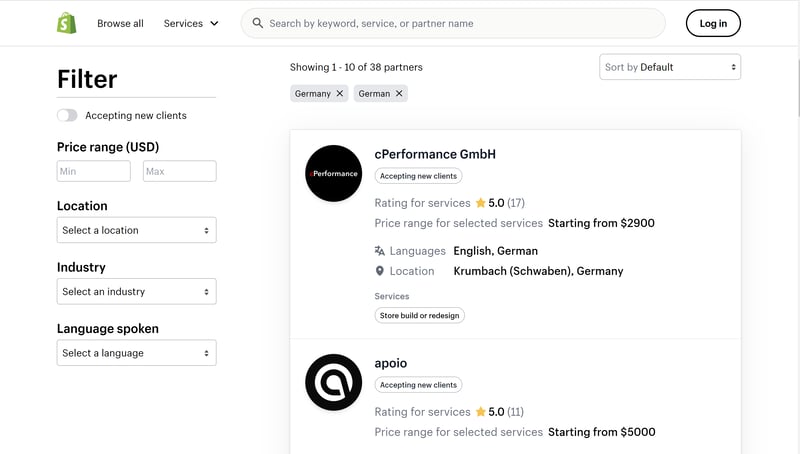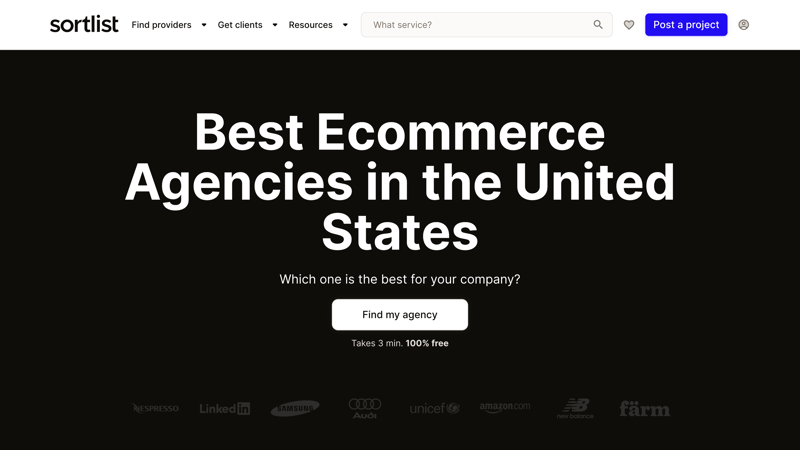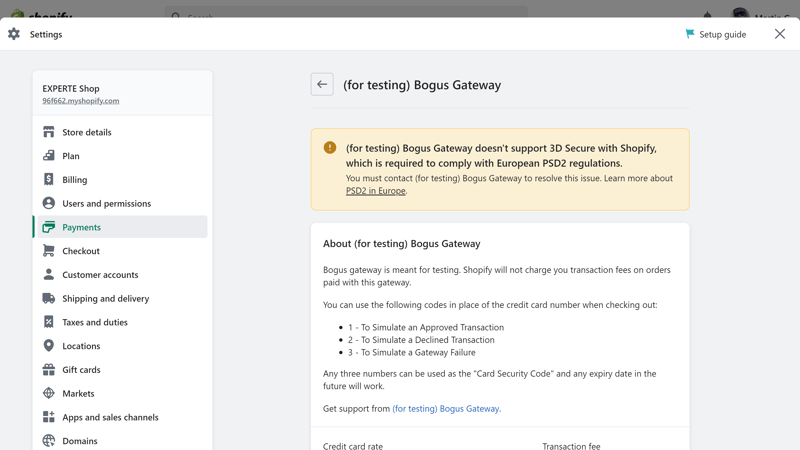Custom Shopify Store: How To Hire Shopify Experts
Thanks to Shopify, it's never been easier to open an online store. But even with the platform's many convenient tools, it still takes quite a bit of time and effort to design a high-quality ecommerce website. Why not leave it up to the pros?
In this article, you'll learn how to hire Shopify experts to design your store for you, how much it costs, and what you should pay attention to.
When considering experts to design your Shopify store, you have two main options: freelancers or agencies.
But before diving into the pros and cons of each, it's worth mentioning Shopify Partners. This network provides direct access to pre-selected freelancers and agencies.
Shopify Partners: Collaborate With Shopify Pros
Through Shopify Partners, you can access experts for your Shopify store directly on Shopify's website.
The platform features a wide range of professionals, including consultants, developers, and app designers. Just click on Store Setup to find partners who can assist in designing and setting up your store. You can filter experts by price, location, industry, or language.

Use Shopify Partners to find agencies and freelancers to help you create your online store.
Shopify Partners maintains high-quality standards by requiring freelancers and agencies to undergo a selective application process. Only those who meet specific criteria, such as possessing a certain level of experience with the platform, are added. This approach guarantees that you find proven experts through Shopify Partners.
Hire a Freelancer to Create Your Shopify Store
There are plenty of freelance web designers and developers eager to help you launch your ecommerce site. Since Shopify is one of the most popular ecommerce platforms, many freelancers have specialized in it.
Where to Find Freelancers
There's no one-size-fits-all approach to finding a Shopify-savvy freelancer. Here are some effective strategies:
Shopify Partners
We just mentioned it, but we'll say it again: Shopify Partners is an excellent starting point to find vetted freelancers familiar with Shopify. Although it isn't possible to search specifically for freelancers, and agencies are more prevalent, you can find capable and willing freelancers if you invest a bit of time.You can sort freelancers by their ratings, experience, and specific skills to find the right one for your project. All collaboration, from communication to payment, takes place directly on the platform, making it safe and straightforward for all parties.
Web search
Of course, you can also just start your search on Google. If you find the right freelancer on your own, you can bypass intermediary fees from platforms like Upwork.Personal contacts and recommendations
The specialist you're looking for might be right under your nose. Ask friends and colleagues or check your LinkedIn, Facebook, or Instagram network for acquaintances with Shopify experience.
Freelancer Costs: How Much Does a Freelancer-Designed Shopify Store Cost?
Pricing is different from project to project and freelancer to freelancer, depending on several key factors:
Experience and specialization: Freelancers with significant Shopify experience and successful projects command higher fees. Conversely, those less specialized tend to be more affordable.
Project extent: A small store with a handful of products and a straightforward design will cost much less than a comprehensive one with many bells and whistles.
Location: Freelancers from regions with a higher cost of living usually charge more compared to those from areas where living costs are lower.
Pricing model: Freelancers may prefer hourly rates or a flat fee for the entire project. Ensure you discuss payment terms, including what is and isn’t included, upfront.
Broadly speaking, for a Shopify store created by a freelancer based in a developed country (such as the US or Canada), you should set aside at least $2,000 to $5,000. More detailed projects can quickly double to $10,000 or more.
Remember, the price of a freelancer-designed Shopify store hinges on numerous factors. Always set clear expectations and discuss pricing details before beginning the project.
While a $500 site might seem economical, it likely sacrifices quality, uniqueness, or functionality. For a truly bespoke online store, you should set aside at least $5,000. However, price alone doesn't ensure quality; some freelancers may overcharge for their services.
To avoid disappointment, make sure to thoroughly vet the freelancer’s portfolio and previous work. This ensures they're the right match for your project. Further down, we've prepared more tips for how to find the right freelancer and make the most out of your collaboration.
Pros and Cons of Freelancers
Cost-efficiency
Freelancers tend to be more affordable than agencies, since you're paying solely for a single person's services. Prices vary widely, offering options for every budget level, including lower-priced markets.Direct communication
Working with a freelancer means direct communication with the person handling your project. This prevents misunderstandings and ensures that your feedback and comments are received word for word.Flexibility
Freelancers typically offer more flexibility than agencies in adjusting their schedules to meet your deadlines. And if you're not satisfied with the way things are going or the final result, you can always hire a new freelancer.Huge selection
There are freelancers for any budget, industry, or specialization — you just need to find the perfect fit for your project.
Less security
Just about anyone can call themselves a "Shopify specialist". This low barrier to entry means vetting for a genuine specialist can be challenging.Fewer resources
Flexibility is a double-edged sword for freelancers: Because they often work for multiple clients simultaneously and need to allocate their time to where it's most needed, they might not prioritize your project.A narrower range of services
Unlike agencies, which employ a variety of specialists, freelancers are typically experts in only one or two fields. In some cases, you might need to hire other freelancers for specific aspects of your project.
Hire an Agency to Design Your Shopify Store
You'd rather hire a team of experts than just a single pro? If so, you might want to consider going the agency route.
Agency Search: Where to Find a Good Agency for Shopify?
Finding a good agency isn't so different from finding a good freelancer. You can start with Shopify Partners to find agencies well-versed in Shopify. Platforms like Upwork also list agencies, providing a range of options.
If you're researching on Google, you can specify your search with details like the agency's location, cost expectations, or specific niche to refine your results.
Additionally, there are services like Sortlist that specialize in connecting you with suitable agencies. After you provide your project criteria, Sortlist suggests a list of agencies that match your needs, allowing you to contact the ones that seem most promising.

Services like Sortlist can help you find the right agency for any project.
Agency Costs: How Much Does an Agency-Built Shopify Store Cost?
Just like freelancer-designed Shopify stores, those built by agencies vary in terms of cost, and mostly for the same reasons. Broadly speaking, though, agencies are pricier than freelancers.
For a basic Shopify store built by an agency based in the UK or US, you should expect to pay around $5,000 to $15,000. More complex and/or customized projects can quickly cross the $20,000 threshold, while full-fledged ecommerce platforms will cost six figures and upwards.
This doesn't mean that there aren't affordable agencies, but the spectrum isn't anywhere as wide as with freelancers.
Pros and Cons of Agencies
A wider range of services
Agencies offer a more comprehensive suite of services than individual freelancers, making them suitable for complex or multifaceted projects.Structured processes
Agencies often have dedicated teams for client communication and project management. This greatly increases the likelihood of your project being completed on time and according to schedule.Better quality control
With a reputation to maintain, agencies — more so than freelancers — are motivated to deliver high-quality results through formal structures and standards.Greater capacity
Agencies have more capacity, enabling them to tackle larger and simultaneously running projects. Project managers ensure that developers and designers complete their work on time and according to schedule.
Higher costs
The overhead costs of agencies are higher than those of freelancers, making them a more expensive option.Less direct contact
As an agency client, you might have little to no direct contact with the specialists handling your project. This can lead to misunderstandings and delay the process.Not as flexible
Agencies tend to work in a more structured manner, which means they might be less adaptable to unique client needs or quick changes, often relying on tried-and-true methods
Working with Freelancers and Agencies: Key Tips
Whether you're collaborating with freelancers or agencies, the end goal remains the same: to realize your vision for your Shopify store. Choosing the right partner, who understands and can effectively execute your vision, is key to a successful collaboration.
Here are several steps to make your experience with either freelancers or agencies as rewarding as possible:
Before selection:
Clarify Your Objectives: Understanding what you want from your Shopify store, including specific features and expectations, is the first step. The clearer your objectives, the easier it is to find a partner who aligns with your vision.
Check their work samples and portfolio: Both agencies and experienced freelancers usually showcase their work. Examine their portfolios to assess the quality and see if it matches what you're looking for.
Read testimonials and check their references: Customer testimonials (either on the freelancer or agency's website or their LinkedIn page) can offer insight into the quality of their work and the satisfaction of their clients.
Compare prices and offers: Once you've identified a pool of prospective partners, contact each for a preliminary estimate of what your project will cost. This should include detailed information about the project's scope, schedule, costs, and desired outcomes or goals.
Get in touch with the leading prospects: Engage in preliminary talks to gauge their technical capability, communication style, and understanding of your project. If you get a bad feeling after the first meeting, or spot any red flags, cross them off your list. Most importantly, ensure they grasp your vision and expectations.
During the project:
Set milestones: Define clear milestones for your Shopify store. This allows you to better monitor progress and ensure that your project advances as planned.
Maintain communication: Keep the lines of communication open at all times. Schedule regular meetings or status updates to stay informed and keep your project on course.
Give feedback: Be proactive and honest when it comes to feedback. This helps your partners better understand your expectations and adjust their work to cater to them.
Test the final product: Once the freelancer or agency has submitted your Shopify store to you for review, thoroughly examine and test it. Verify that all agreed-upon features are included and functional, and that the store meets your overall expectations.

Complete a trial order to see whether your Shopify store works as planned.
After completion:
Training and documentation: If you're interested in understanding how to manage your store or make minor design changes yourself, ask for training and relevant documentation. This empowers you to make adjustments without constantly needing external help.
Analysis and optimization: Once your store is live, it's crucial to monitor its performance closely. Keep an eye on visitor statistics and behaviors. Your freelancer or agency should be able to help you interpret these metrics and suggest ways to enhance your store's performance.
Alternative: Create Your Shopify Store Yourself
If you're working with a tight budget, you might need to build your Shopify store by yourself. That's entirely feasible—even without web design or programming skills. In the following guide, we'll walk you through setting up your first Shopify store on your own:
Conclusion
Want to hire someone to build your Shopify store for you? If so, you have several options: hiring a specialized freelancer, engaging an agency, or tapping into Shopify Partners — a network vetted by Shopify itself for quality assurance.
Freelancers are usually more affordable, flexible, and provide a more personal collaboration experience than agencies. The freelancer pool is vast, catering to various budgets and niches. However, they might lack the resources and consistency in quality an agency can provide.
Agencies, on the other hand, bring a team of experts to the table, ensuring specialized attention across all aspects of your store's design and functionality. Of course, this level of expertise comes at a price, and you should expect to pay significantly more than a freelancer — with reduced flexibility.
Or maybe you want to give it a go yourself? Our Shopify guide is a great starting point.














